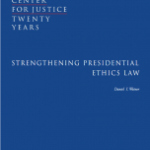The following is an excerpt from a new report on the need for Presidential ethics reform by the Brennan Center for Justice at NYU School of Law. Continue reading here: www.brennancenter.org
Marked by conflicts of interest and ethical lapses, the first year of the Trump presidency has fueled debates about our system of federal ethics system in Washington and across the nation. This report lays out a comprehensive policy agenda outlining steps Congress can take to address to prevent self-dealing by the country’s top leaders. It identifies three main solutions towards eliminating most pressing gaps in the country’s federal ethics system: closing the presidential loophole, bolstering disclosure requirements for high-ranking officials and strengthening ethics enforcement.
 From the Brennan Center’s press release:
From the Brennan Center’s press release:
In response to the first year of a Trump administration marked by conflicts of interest and ethical lapses, the Brennan Center for Justice at NYU School of Law released today a comprehensive package of solutions to address the most pressing gaps in the country’s federal ethics system. The recommendations seek to prevent self-dealing by the country’s top leaders.
In a new report, Strengthening Presidential Ethics Law, the Brennan Center lays out the case for bringing presidential ethics rules in line with similar standards for other government officials. Today’s report is the first comprehensive policy agenda outlining steps Congress should take to minimize conflicts of interest among the highest echelons of American power.
Among the report’s key recommendations:
- Closing the presidential loophole: Congress must expand federal conflict of interest laws to cover presidents and vice presidents, following the lead set by state governments and other democracies globally.
- Bolstering disclosure requirements for high-ranking officials: High-level officials should be required to disclose income, assets, and debts of closely-held businesses in which the official or an immediate family member has a substantial interest. By expanding the scope of disclosure, Congress will help prevent conflicts of interests from escaping public scrutiny.
- Strengthening ethics enforcement: To effectively administer and enforce federal ethics law, the country needs a strong, well-financed regulator. Congress should confer the same autonomy to the Office of Government Ethics as it affords other independent agencies.
“When Donald Trump took office, he said the president ‘can’t have’ a conflict of interest, and it is true that the President is currently exempt from federal conflict of interest rules,” said the Brennan Center’s Daniel Weiner, the report’s author. “But the conflicts themselves exist. While President Trump isn’t the first national leader with conflicts, his complex financial dealings and disregard for longstanding ethical norms have driven hot national debates about reforming the standards our highest leaders must adhere to. It’s time for sweeping reforms that demonstrate a commitment to leaders who act in the interests of the country, not in the interests of their own bottom line.”
Read the full report, Strengthening Presidential Ethics Law.
Leave a Reply